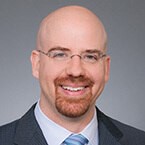The rapid emergence of artificial intelligence in the U.S. has overshadowed its rise overseas, according to Fidelity Portfolio Manager Jed Weiss, who has capitalized by investing in shares of AI-driven international companies, often at substantially more attractive valuations.
“Well-known domestic companies, especially Nvidia (NVDA) and Microsoft (MSFT), have certainly done their part to drive this technology but it truly is a global, interconnected economy,” says Weiss, who manages Fidelity® International Growth Fund (FIGFX).
As longtime manager of this diversified international equity strategy, Weiss favors companies with multiyear structural growth prospects, high barriers to entry, and an attractive valuation, focusing on cyclically out-of-favor businesses with pricing power and limited competition, as well as firms exhibiting strong earnings potential and a share price that has fallen due to macroeconomic events.
Weiss considers semiconductors a cornerstone of AI technology, explaining that foundries around the world leverage highly advanced tools, including extreme ultraviolet lithography, to produce ever faster and smaller semiconductors than enable innovation in AI and 5G mobile communications.
In fact, he adds, EUV would not be possible without the expertise of companies like ASML (ASML), the monopoly maker of EUV lithography machines, as well as Japan’s Lasertec (LSRCY), which Weiss considers the dominant supplier of inspection systems for EUV masks and mask blanks, two critical components in manufacturing an integrated circuit.
Meanwhile, Dutch industrial manufacturing company Aalberts (AALBF) specializes in vibration isolation and provides ultra-precision frames and high-purity fluid systems for the semiconductor industry, making it a beneficiary of AI-powered growth in EUV, notes Weiss.
Among AI-driven software firms overseas, Weiss points to Britain’s Sage Group (SGPYY), a company that utilizes AI and machine learning to drive faster and more-efficient enterprise resource planning, namely integrated accounting, payroll, and payment systems.
“Knowing that all these firms are tied to the theme of AI in one way or another, what also has made them a good fit for my investment process is that their valuations have tended to be generally more attractive, given that overseas equity markets have meaningfully lagged domestic stocks the past several years,” Weiss concludes.
For specific fund information, including full holdings, please click on the fund trading symbol above. Securities mentioned were fund holdings as of January 31.

Jed Weiss is a portfolio manager in the Equity division at Fidelity Investments.
In this role, Mr. Weiss manages Fidelity Series International Growth Fund, Fidelity Series International Small Cap Fund, Fidelity International Small Cap Opportunities Fund, Fidelity Advisor International Small Cap Opportunities Fund, Fidelity International Growth Fund, and Fidelity Advisor International Growth Fund. Additionally, he co-manages Fidelity Total International Equity Fund and Fidelity Advisor Total International Equity Fund.
Prior to assuming his current position in 2007, Mr. Weiss covered the telecommunications, health care, and consumer sectors as an analyst on Fidelity’s Global Emerging Markets team. Previously, he worked as an analyst and portfolio manager of Select Environment Fund, during which he also covered a wide range of industries within the cyclical sector. Prior to that, Mr. Weiss held various other roles at Fidelity, including equity research analyst covering communications, semiconductors, and networking stocks, during which he also managed Select Networking and Infrastructure Portfolio. Additionally, he worked as an equity research analyst covering semiconductors and as an associate analyst covering U.S. regional banks.
Before joining Fidelity in 1997, Mr. Weiss was a summer associate at Goldman Sachs and a legislative affairs intern at the White House. He has been in the financial industry since 1997.
Mr. Weiss earned his bachelor of arts degree in government from Harvard University, where he graduated Phi Beta Kappa.

